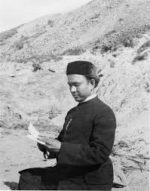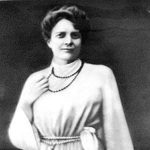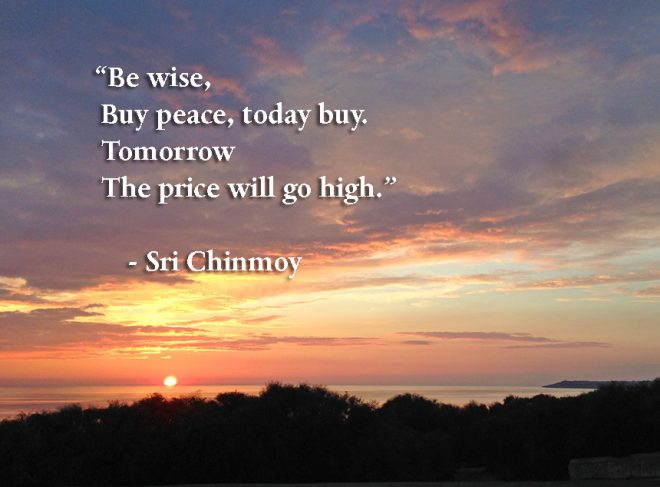The first time Nivedita met Swami Vivekananda was in London in 1895. It was an informal gathering at a private house in a west-end drawing room on a cold Sunday afternoon in November. The Swami was seated, facing a half circle of listeners. Nivedita describes the scene thus: “we were but fifteen or sixteen guests, intimate friends, many of us, and he sat amongst us, in his crimson robe and girdle, as one bringing us news from a far land, with a curious habit of saying now and again “Shiva ! Shiva !” and wearing that look of mingled gentleness and loftiness, that one sees on the faces of those who live much in meditation, that look, perhaps, that Raphael has painted for us, on the brow of the Sistine Child.” (1)
After the meeting most of the guests including Nivedita concluded that what they heard was nothing new. All these things had been said before. Later on Nivedita could not help revising her opinion. She said, “For my own part, however, as I went about the tasks of that week, it dawned on me slowly that it was not only ungenerous, it was also unjust, to dismiss in such fashion the message of a new mind and a strange culture. It occurred to me that though each separate dictum might find its echo or its fellow amongst things already heard or already thought, yet it had never before fallen to my lot to meet with a thinker who in one short hour had been able to express all that I had hitherto regarded as highest and best.” (2) From then on she took every opportunity that came her way, to listen to Vivekananda lecture whenever he was in London.
Even after listening to whole seasons lectures, Nivedita was awed and touched by the beauty of Swami Vivekananda’s thought but “could pass no judgment upon it, much less accept it”. Often she found what Vivekananda said was beyond her comprehension. She said, “…his system (of thought) as a whole, I, for one, viewed with suspicion, as forming only another of those theologies which if a man should begin by accepting, he would surely end by transcending and rejecting. And one shrinks from the pain and humiliation of spirit that such experiences involve.”(3) Yet, by the time Swami Vivekananda left England, she addressed him as “master”. She justified this by saying, “I had recognised the heroic fibre of the man, and desired to make myself the servant of his love for his own people. But it was his character to which I had thus done obeisance. As a religious teacher, I saw that although he had a system of thought to offer, nothing in that system would claim him for a moment, if he found that truth led elsewhere. And to the extent that this recognition implies, I became his disciple. For the rest, I studied his teaching sufficiently to become convinced of its coherence, but never, till I had had experiences that authenticated them, did I inwardly cast in my lot with the final justification of the things he came to say.”(4)
Nivedita came to India in January of 1898. A few weeks later a small group of Swami Vivekananda’s disciples from America arrived. Nivedita and this group of western disciples together began “the study of India, and something also of the home aspects and relationships of the Swami’s own life”. Then in the summer of 1898 Swami Vivekananda took them, along with a few of his Indian brother disciples, on a tour of northern India.
Up until this time Nivedita was skeptical of Swami Vivekananda’s philosophy even though she had accepted him as her “master”. She said, “My relation to our Master at this time can only be described as one of clash and conflict. I can see now how much there was to learn, and how short was the time for learning to be, and the first of lessons doubtless is the destroying of self-sufficiency in the mind of the taught.” (5) So, it was on this trip that Swami Vivekananda’s training began of “his most rebellious disciple”. He constantly rebuked her and attacked her thinking and line of reasoning which were her most cherished possessions. She said, “Suffering is often illogical, and I cannot attempt to justify by reason the degree of unhappiness which I experienced at this time, as I saw the dream of a friendly and beloved leader falling away from me, and the picture of one who would be at least indifferent, and possibly, silently hostile, substituting itself instead.” (6) Even though she was not prepared for this kind of treatment yet she did not retract her own proffered service to the master.
The master’s training of the disciple continued and it seemed there was no end to Nivedita’s suffering. Finally one of the older ladies of the party, feeling that “such intensity of pain inflicted might easily go too far”, interceded with the Swami. Vivekananda silently listened and went away. He returned in the evening and told the old lady, it seems with the simplicity of a child, “You were right. There must be a change. I am going away into the forests to be alone, and when I come back I shall bring peace.” Then as he turned and saw the new moon in the sky he said, “See! the Mohammedans think much of the new moon. Let us also with the new moon begin a new life !” By this time Swami Vivekananda’s “most rebellious disciple” – Nivedita was kneeling before him. He lifted his hand and blessed her as she put it “with silent depths of blessing”. Later recollecting this incident Nivedita writes, “It was assuredly a moment of wonderful sweetness of reconciliation. But such a moment may heal a wound. It cannot restore an illusion that has been broken into fragments. And I have told its story, only that I may touch upon its sequel.. Long, long ago, Sri Ramakrishna had told his disciples that the day would come when his beloved “Noren” (Swami Vivekananda’s pre-monastic name) would manifest his own great gift of bestowing knowledge with a touch. That evening at Almora (a city in northern India where they were camping during that time), I proved the truth of his prophecy. For alone, in meditation, I found myself gazing deep into an Infinite Good, to the recognition of which no egoistic reasoning had led me. I learnt, too, on the physical plane, the simple everyday reality of the experience related in the Hindu books on religious psychology. And I understood, for the first time, that the greatest teachers may destroy in us a personal relation only in order to bestow the Impersonal Vision in its place.” (7)
References:
1) The Master as I saw him, Pg. 6, Nivedita, Longman’s, Green and Co., London, 1910.
2) The Master as I saw him, Pg. 13, Nivedita, Longman’s, Green and Co., London, 1910.
3) The Master as I saw him, Pg. 15, Nivedita, Longman’s, Green and Co., London, 1910.
4) The Master as I saw him, Pg. 16, Nivedita, Longman’s, Green and Co., London, 1910.
5) The Master as I saw him, Pg. 136, Nivedita, Longman’s, Green and Co., London, 1910.
6) The Master as I saw him, Pg. 137, Nivedita, Longman’s, Green and Co., London, 1910.
7) The Master as I saw him, Pg. 139, Nivedita, Longman’s, Green and Co., London, 1910.
“Vivekananda came into the world in an age seething with rank materialism. Spiritual values were at a discount. He held the mighty torch of spirituality high. Exceptional was his clarion call to lead the life of the Spirit. The soul-stirring message of Sri Ramakrishna was embodied in him, in this lion amongst men. And as regards the message of India to the world, “Remember,” declares Vivekananda, “not the Soul for Nature, but Nature for the Soul.””~ Sri Chinmoy
 Leonardo da Vinci was a remarkable man. A man of both science and art, who matched a ceaseless creativity with a passion and devotion for discovering the wonders and beauty of life.
Leonardo da Vinci was a remarkable man. A man of both science and art, who matched a ceaseless creativity with a passion and devotion for discovering the wonders and beauty of life. 





